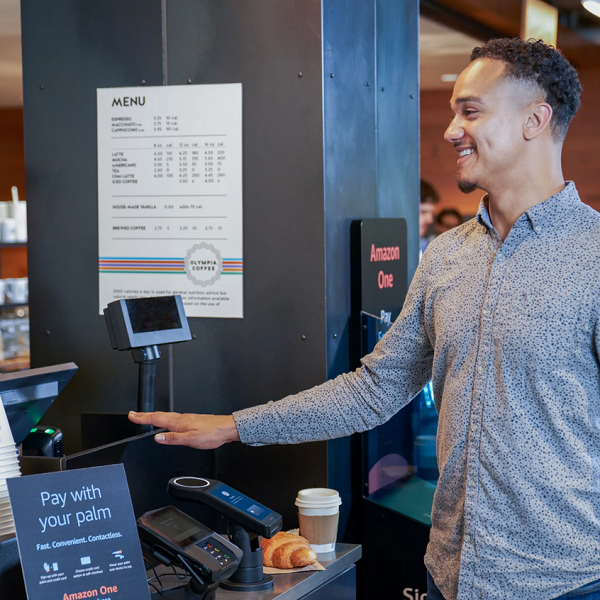
Amazon One palm payment technology is coming to 500+ Whole Foods Market stores in the U.S.
As Amazon One – Amazon Web Services’ palm recognition service for identification, payment, loyalty membership, and entry at over 400 locations across the U.S. – reaches a critical milestone with more than 3 million uses, Whole Foods Market stores are going all in.
By the end of this year, all 500+ Whole Foods Market locations in the U.S. will offer Amazon One for payment and Prime membership benefits. This means Whole Foods Market customers who choose to use Amazon One will no longer need their wallet or even a phone to pay—they can simply hover their palm over an Amazon One device. For Prime members who link their Amazon One profile with their Amazon account, savings will automatically be applied. It’s that simple.
Amazon One is currently available at more than 200 Whole Foods Market locations across the U.S., including Arizona, Arkansas, California, Colorado, Idaho, Kansas, Louisiana, Michigan, Mississippi, Missouri, Montana, Nevada, New Mexico, New York, Oklahoma, Oregon, Texas, Utah, Washington, and Wyoming. Amazon One will continue to be rolled out to Whole Foods Market stores in other states and U.S. locations over the coming months.
In addition to Amazon One’s availability at stores like Amazon Fresh stores and Whole Foods Market locations, third-party businesses are increasingly offering Amazon One as an identification and payment option for their customers—and some of them are also using Amazon One in new ways.
Travel retailers, like Hudson, CREWS, and OHM, understand the benefits of palm payment in busy airport environments, and have deployed Amazon One at their airport stores in Atlanta, Charleston, Dallas, Dulles, Kansas City, Los Angeles, Newark, Nashville, Seattle, and more. Sports venues are revolutionizing the fan experience through partnerships with businesses like AXS, Compass, Delaware North, Levy, Penn Entertainment, Sodexo, and others. Currently, Amazon One is available at sports stadiums like Bridgestone Arena, Climate Pledge Arena, Globe Life Field, Lumen Field, T-Mobile Center, T-Mobile Park, NASCAR Raceway, and Texas A&M’s Kyle Field, as well as entertainment venues like Hollywood Casino at Greektown in Detroit, and more. Amazon One is also available at several grocery and convenience stores.
First-time Amazon One users can pre-enroll online with their credit or debit card, Amazon account, and mobile number, and the process takes about a minute. They can then complete the enrollment process in seconds by scanning their palm over an Amazon One device the next time they visit a participating Whole Foods Market store—or anywhere Amazon One is available. Once enrolled, Amazon Prime members will automatically see savings and other Prime member benefits applied to their Whole Foods Market store purchases. Alternatively, customers can also enroll for Amazon One in the store at an Amazon One device with their credit card and phone number.
“We are always looking for new ways to delight our customers and improve the shopping experience,” said Leandro Balbinot, Chief Technology Officer at Whole Foods Market. “Since we’ve introduced Amazon One at Whole Foods Market stores over the past two years, we’ve seen that customers love the convenience it provides, and we’re excited to bring Amazon One to all of our customers across the U.S.”
Amazon One helps businesses speed up their identification and payment processes, enable customers to easily link to and access their loyalty programs, verify age, and provide secure access to sports and entertainment venues, office buildings, and more.
Amazon One has partnerships with American Express, Discover, MasterCard, Visa, and major banks across the U.S., enabling cardholders to use Amazon One and enjoy the benefits of fast and convenient identification and payment.
Additionally, unlike a credit card or password, an Amazon One palm signature can’t be replicated to impersonate a customer. That’s because Amazon One does not use raw palm images to identify a person. Instead, it looks at both the palm and underlying vein structure to create a unique numerical, vector representation—called a “palm signature”—for identity matching.
Further, customer palm data is safeguarded in the AWS Cloud. AWS is backed by more than 300 cloud security tools and 100,000 security partners from around the world. In addition, Amazon One is protected by multiple security controls and has tamper-detection capabilities that will render the device unusable if meddled with.


